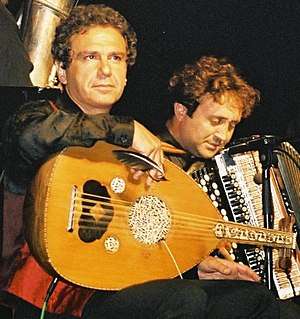Rabih Abou-Khalil
| Rabih Abou-Khalil | |
|---|---|
 | |
| Background information | |
| Born | August 17, 1957 |
| Origin | Beirut, Lebanon |
| Genres | Ethno jazz, world fusion |
| Occupation(s) | Musician, composer, bandleader |
| Instruments | Oud, flute |
| Years active | 1980–present |
| Labels | Enja Records |
Rabih Abou-Khalil (Arabic: ربيع أبو خليل, born August 17, 1957 in Lebanon)[1] is an oud player and composer. He is known for fusing traditional Arab music with jazz, European classical music, and other styles.
Life
Rabih Abou-Khalil grew up in Beirut and moved to Munich, Germany during the civil war in 1978.[2] He lives part-time in Munich and part-time in the South of France with his wife.
Music
Abou-Khalil studied the oud at the Beirut conservatory with oudist Georges Farah. After moving to Germany, he studied classical flute at the Academy of Music in Munich under Walther Theurer.
He has often blended traditional Arab music with jazz, rock and classical music, and has earned praise such as "a world musician years before the phrase became a label—makes the hot, staccato Middle Eastern flavour and the seamless grooves of jazz mingle as if they were always meant to."[3] Together with Anouar Brahem he has helped highlight the oud as a vehicle of eclectic "world jazz". One critic likened Abou-Khalil's oud playing style to jazz guitar, writing: "Abou-Khalil spins more oud notes in 10 seconds than most jazz guitarists do in their short commercial lifespans".[4]
Albums
In his first CD release for the ECM company wasNafas (1988). Al-Jadida (1992) featured alto saxophonist Sonny Fortune; Blue Camel (1992), featured alto saxophonist Charlie Mariano and flugelhorn player Kenny Wheeler.
Nafas and Tarab make use of the ney, the Turkish end-blown flute. 1995's Arabian Waltz featured Abou-Khalil's compositions for string quartet (performed by the Balanescu Quartet), along with oud, tuba (or serpent), and frame drums.
Morton's Foot (2004) brings in Luciano Biondini on accordion and Sardinian singer Gavino Murgia.
Journey to the Centre of an Egg (2005) features a trio of oud, piano (Joachim Kühn, who doubles on alto saxophone) and drums.
In 2008, Abou-Khalil released an album entitled "Em Português" ("In Portuguese"), where he mixes Fado with Arabic music, with the participation of the fadista Ricardo Ribeiro.
Visions of Music
Rabih Abou-Khalil hosted the television series Visions of Music. This 13-part documentary series produced by EuroArts Entertainment set out to explore the blending of jazz with traditional music (Caribbean salsa, Brazilian samba, Argentine tango, French musette, Spanish flamenco, Jewish klezmer, New Orleans R&B and Mississippi blues, as well as West African, South African, Indian and Middle Eastern music) through historical footage and interviews of musicians (by Abou-Khalil). The music of the TV-series was released on the album Visions of Music - World Jazz by Enja Records in 1998.
Collaborators
- Howard Levy (harmonica)
- Glen Velez (frame drums, percussions)
- Milton Cardona (conga)
- Sonny Fortune (alto saxophone)
- Glen Moore (bass)
- Steve Swallow (bass)
- Gabriele Mirabassi (clarinet)
- Luciano Biondini (accordion)
- Michel Godard (tuba)
- Mark Nauseef (percussion)
- Gavino Murgia (vocals, tenor saxophone)
- Jarrod Cagwin (drums)
- Selim Kusur (vocals, nay)
- Setrak Sarkissian (darabukka)
- Joachim Kühn (piano, alto saxophone)
- Ramesh Shotham (Indian percussion)
- Alexander Bălănescu (violin)
- Nabil Khaiat (percussion)
- Charlie Mariano (alto saxophone)
- Gevorg Dabagyan (duduk)
- Kenny Wheeler (Flugelhorn)
- ARTE Quartett (saxophone quartet)
Discography
- Compositions & Improvisations (MMP, 1981)
- Bitter Harvest (MMP, 1984)
- Between Dusk and Dawn (MMP, 1987; Enja Records, 1993)
- Bukra (MMP, 1988; Enja Records, 1994)
- Nafas (ECM, 1988)
- Roots & Sprouts (MMP/Enja Records, 1990)
- World Music Orchestra: East West Suite (Granit Records, 1990)
- Al-Jadida (Enja Records, 1991)
- Blue Camel (Enja Records, 1992)
- Tarab (Enja Records, 1993)
- The Sultan's Picnic (Enja Records, 1994)
- Arabian Waltz (Enja Records, 1996)
- Odd Times (Enja Records, 1997)
- Yara (Enja Records, 1998) - film score
- The Cactus of Knowledge (Enja Records, 2001)
- Il Sospiro (Enja Records, 2002)
- Morton's Foot (Enja Records, 2003)
- Journey to the Centre of an Egg (Enja Records, 2005)
- Songs for Sad Women (Enja Records, 2007)
- Em Português (Enja Records, 2008)
- Trouble in Jerusalem (Enja Records, 2010)
- Hungry People (World Village, 2012)
Compilations
- Selection (Enja Records, 2009)
As guest musician
- Chris Karrer: Dervish Kish (Schneeball/Indigo, 1990/91)
- Michael Riessler: Heloise (Wergo, 1992)
- Charlie Mariano & Friends: Seventy (veraBra records, 1993)
- Glen Moore: Nude Bass Ascending (Intuition, 1996/97)
- Ramesh Shotam: Madras Special (Permission Music, 2002)
Other
- Jakob Wertheim & Rabih Abou-Khalil: KopfKino (cassette, Ohrbuch-Verlag, 1988)
- The Jazz Club Highlights (DVD, TDK JAZZ CLUB, 1990)
- Rabih Abou-Khalil presents Visions of Music - World Jazz (accompanying TV series, Enja Records, 1999)
References
- ↑ Kennedy, Gary W. (2002). "Abou-Khalil, Rabih". In Barry Kernfeld. The new Grove dictionary of jazz (2nd ed.). New York: Grove's Dictionaries Inc. p. 6. ISBN 1561592846.
- ↑ "Rabih Abou-Khalil | Biography & History | AllMusic". AllMusic. Retrieved 2017-09-06.
- ↑ The Guardian
- ↑ Orlando Weekly
External links
- The Official myspace.com Page
- Official website
- Rabih Abou-Khalil page at ENJA Records
- Rabih Abou Khalil at All About Jazz
- RABIH ABOU-KHALIL - LIST OF ISSUED RECORDS compiled by Johann Haidenbauer
- Rabih Abou-Khalil
- Fotos Rabih Abou Khalil & Termites at work - 2007 jazzit
- Portrait of Rabih About-Khalil on Qantara.de by Lewis Gropp